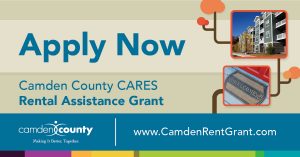 (Camden, NJ) – At 8 a.m. this morning the Freeholder Board launched a new program aimed at supporting renters at risk of losing their homes or facing an eviction threat due to lost employment or income caused by the COVID-19 pandemic.
(Camden, NJ) – At 8 a.m. this morning the Freeholder Board launched a new program aimed at supporting renters at risk of losing their homes or facing an eviction threat due to lost employment or income caused by the COVID-19 pandemic.
The Camden County Rental Assistance Program makes available up to six months of back rent (April 2020 through September 2020) for a maximum of $4,000. While tenants will apply to take part in the program, payments will be made directly to landlords.
“There has been a crisis quietly building in the halls of rental properties across New Jersey and throughout the United States. While evictions have been paused to protect renters from being left homeless during this crisis, families are watching what they owe grow without any idea of how they’ll settle that debt before evictions resume,” said Freeholder Director Louis Cappelli, Jr. “Using $4 million of funding made available by the federal CARES Act, the Freeholder Board is hoping to alleviate some of that concern for renters in our community. This won’t be a panacea, but it will be a significant lifeline to hundreds of families.”
In order to qualify for Rental Assistance Program, tenants must meet the following eligibility and rules:
- Tenants cannot earn more than 50% of Average Area Median Income (AMI);
- Applicants will be required to provide proof of loss/reduction in employment or income;
- No duplication of funds will be permitted – apartments/landlords which are funded under the State’s tenant assistance program or Section 8 are not eligible;
- Landlords must agree to waive late fees and penalties accrued from April 2020 to September 2020; and
- Lease must have begun prior to 3/1/2020.
Camden resident, Vanessa Velez, was the first applicant to be certified for rental assistance this morning. She applied at 8 a.m. and received confirmation from the program soon thereafter in an email.
“I’ve been out of work since May 29, raising four kids, and this has been first time in my life that I have not been able to make my rent payments,” Velez said. “Dealing with the collateral damage from COVID has been a real struggle for me and my family and I can tell you this assistance will go a long way for us.”
Congressman Donald Norcross has been working in partnership with the county governing body to get federal funds back into the community as quickly as possible.
“The CARES Act has delivered critical federal resources to local governments, and I applaud Camden County’s innovation in creating this rental assistance program to help residents struggling to make payments,” Norcross said. “This money will provide vital funding renters who need our support during the ongoing public health crisis.”
More information regarding the Rental Assistance Program, how to apply, and the additional eligibility requirements is available by visiting www.camdencounty.com.
Income limits:
- 1-person, $33,850
- 2-person, $38,650
- 3-person, $43,500
- 4-person, $48,300
- 5-person, $52,200
- 6-person, $56,050
Applications for the program will be awarded on a first come, first served basis, and will be accepted until all available funds have been awarded. To apply, visit: www.CamdenRentGrant.com. For any questions about the program call (833) 487-0462.
Patric Ciervo, owner of Main Street Realty talked about the impact the federal funds will have on the local economy.
“This program will be another significant benefit to landlords and business owners who have gone months without rental payments,” Ciervo said. “We have been in a holding pattern since the start of the pandemic and this initiative is a win-win for the tenant and landlord.”
The Camden County Rental Assistance Program is another initiative to offset some the cratering losses that residents and small business owners have seen since the start of the pandemic. In July, the Freeholder Board provided $25 million in funding to small businesses and nonprofits with grants up to $10,000. That program was also launched in Collingswood’s downtown with Mayor Jim Maley who joined the today’s announcement.
“This is exactly the kind of program that is needed for residents who have been inordinately impacted by COVID and cannot make their rental payments,” Maley said. “When eviction moratoriums expire later this year this program will be a lifeline for tenants who are struggling and won’t be exposed to legal proceedings.”
